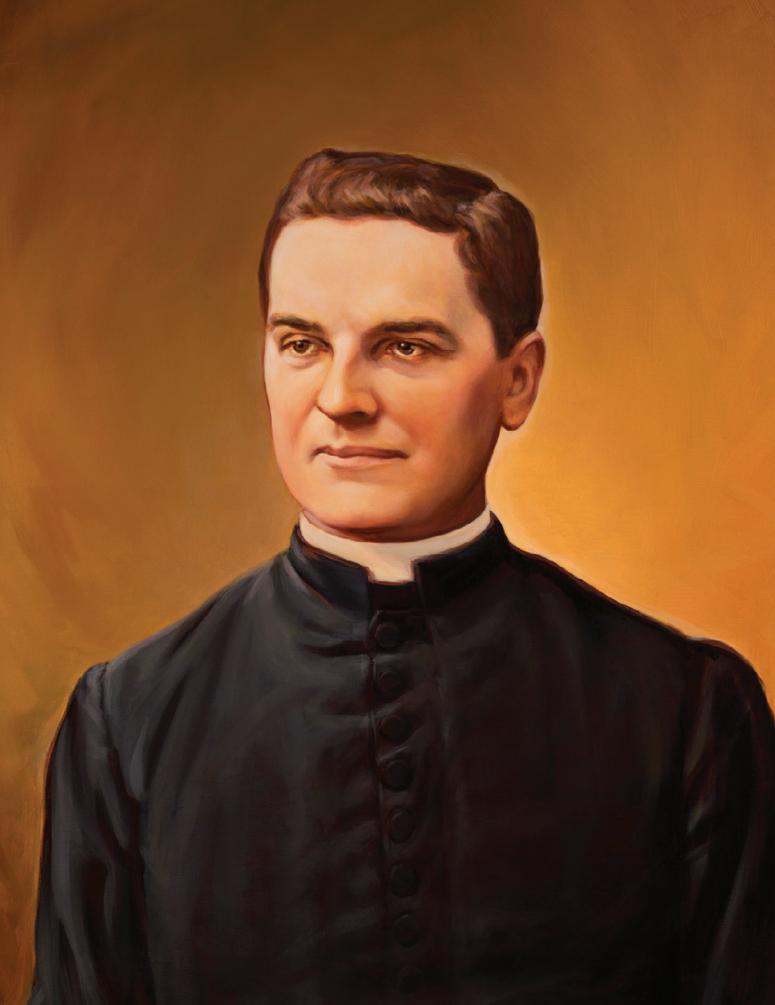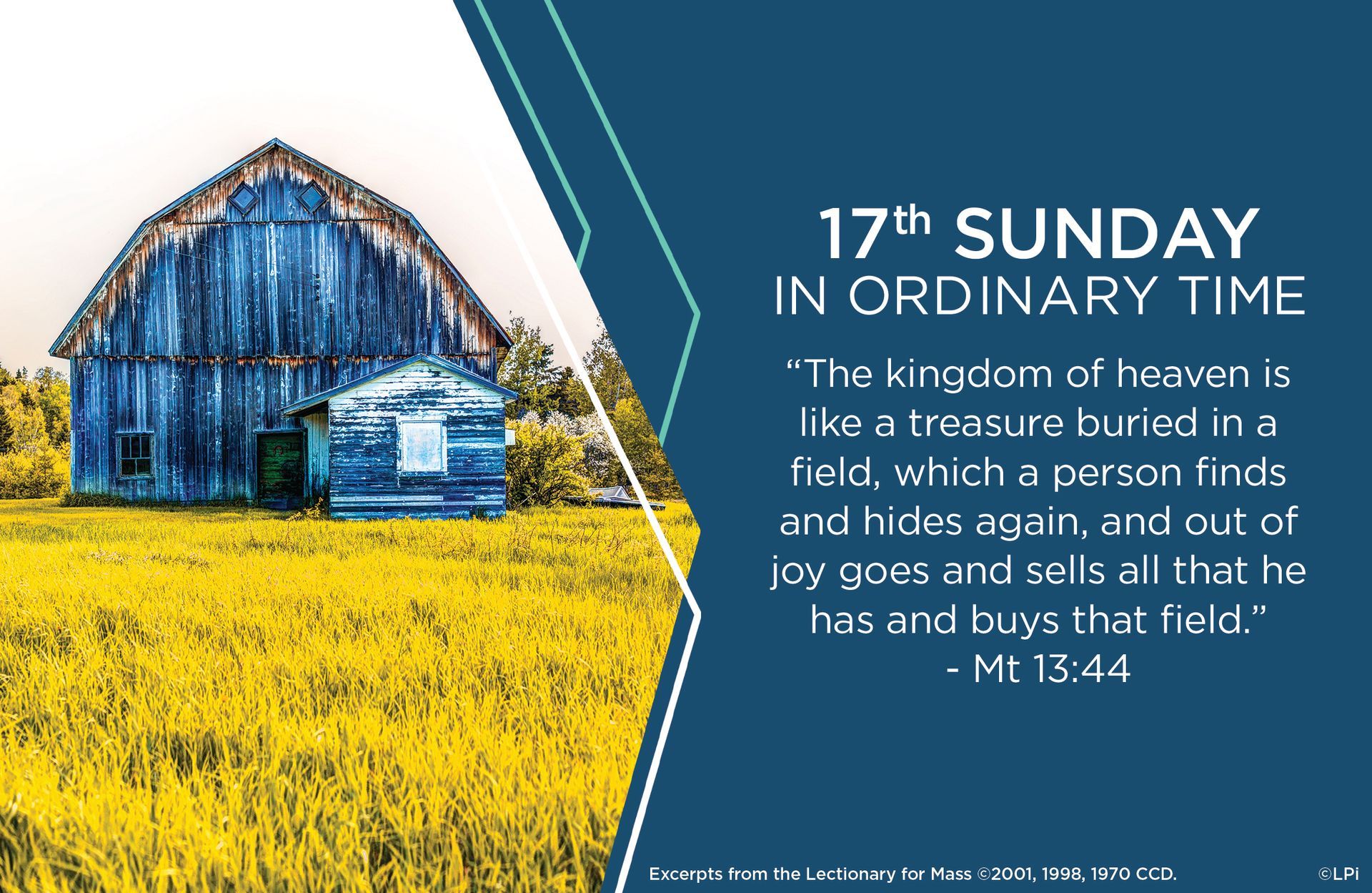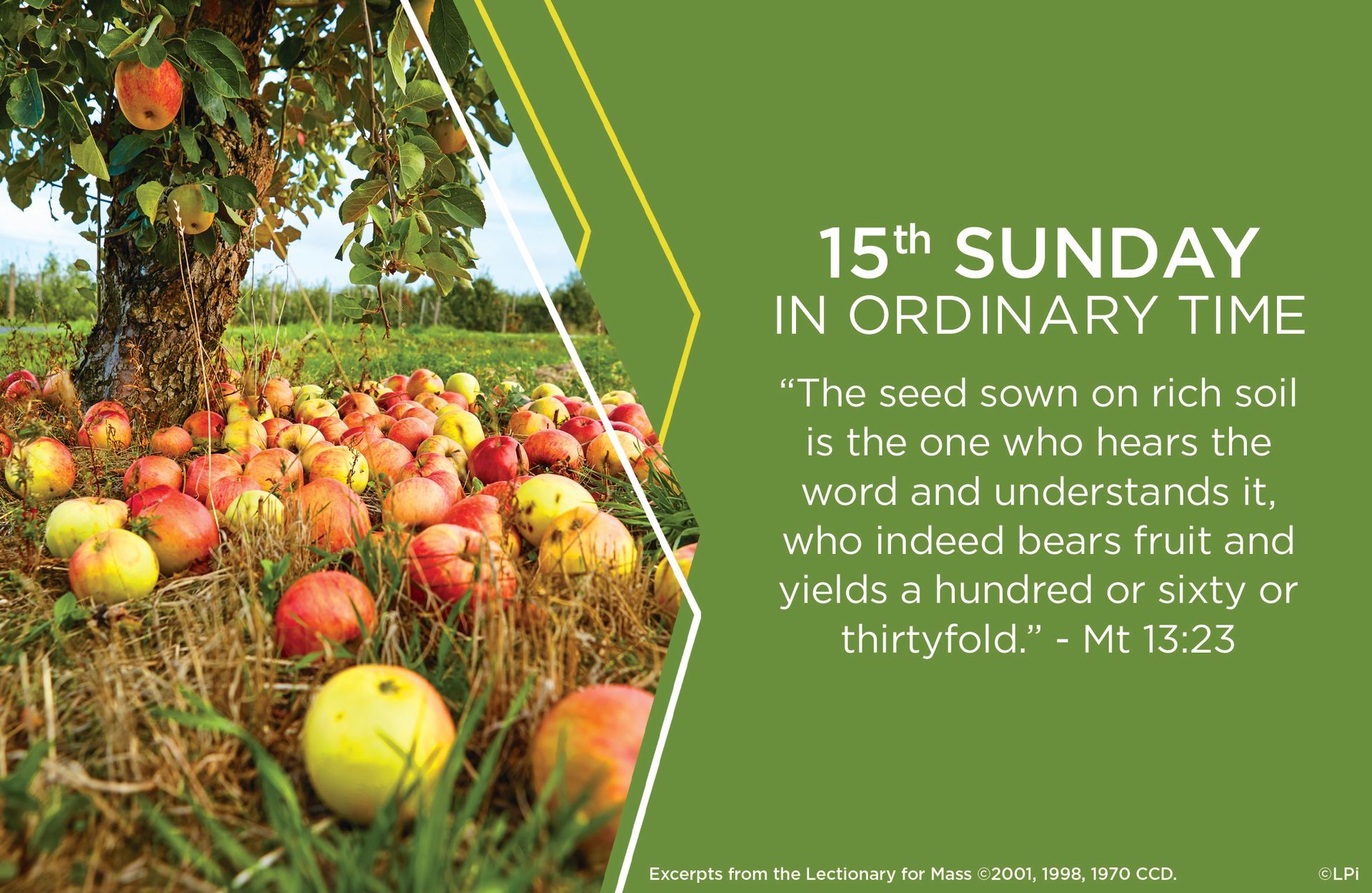The Wisdom of Contentment

In this weekend’s readings we see that Solomon is praised for choosing wisdom, St. Paul calls us to conform ourselves to Christ’s divine life, and Christ Himself tells us to find the “Treasure in the field,” and the “Pearl of Great Price.” All three of these readings have an underlying promise which is happiness.
The readings this weekend point us to contentment and through contentment happiness. At first reading you might think these readings are about seeking out the best things and obtaining them. Perhaps you could read the Treasure in the Field and say to yourself, “If there is something truly great out there, I should save every penny so I am ready to buy it.” Is that what Jesus meant? Many of us have owned pearls of great price and have treasures in our own fields. The minute we obtain them we rejoice, but soon after realize that a greater pearl has been discovered, a greater treasure buried, or that these things did not bring the expected joy.
Perhaps you bought the best model of the newest car, the newest phone, or the best pair of shoes on the market. Then we discover that after a short time a new model is released and is better than what you have. We are tempted to discard the good for the better rather than infusing what we have with our gratitude for its goodness. Watch commercials on television and note how many times you see the words, “New,” “Improved,” or “Better.” The message, don’t be satisfied with what you have, don’t be content, buy this better version and then the marketers promise you joy, happiness, and other pleasures. Honestly, I’ve never seen happier people cleaning up spills then the people in paper towel commercials.
The key to cracking today’s readings wide open is to read the story of the woman at the well ( JN 4 ). Jesus gently instructs her that if she understood who He was that she would have asked him for “Living water.” Jesus explained it by saying, “Everyone who drinks this water will be thirsty again, but whoever drinks the water I give them will never thirst. Indeed, the water I give them will become in them a spring of water welling up to eternal life.” It is here that she asks for the water. Jesus’ response is to point out that she has had five husbands and the one the woman lives with now is not her husband. Why? To illustrate her life as a perfect example of someone who has never known contentment. The “Living Water” is the water of Baptism which gives to each of us a share in Divine Life. We become “Conformed to the Image of Christ” ( 2nd Reading: Rom 8:28-30 ). It is this conformity to Divine Life that gives us the joyful satisfaction of contentment and leads us to a perpetual happiness in Jesus Christ.
Look again at the interaction between God and Solomon, God praised him because he did not choose the things that would be spent or that would perish (including his own life), but rather he chose wisdom and understanding. What did he do with that wisdom? He wrote the book of Ecclesiastes which begins “Vanity of vanities, says Qoheleth, vanity of vanities! All things are vanity!” ( Ecclesiastes 1:2 ). He was wise enough to see the perishable nature of all things but God, he became wise enough not to cling to the things of earth. Rather he began to see that there is as much life in pleasure as their is life in suffering. He discovered in wisdom that there is an appointed time for everything ( Ecclesiastes 3 ) and that those who have found contentment have found a road to happiness in all of those appointed times.
The parables of the Pearl of Great Price, the Treasure in the Field, The Lost Coin, and The Fisherman’s Net are all pointing to the same thing. Find Jesus Christ! Give up every earthly good, if that’s what it takes, and find Jesus Christ! For if you find Jesus, partake in your share of the living water (baptismal graces), eat the bread of life (The Eucharist), and daily take up your cross (by the graces of Confirmation) and follow him, your joy will be complete. The love of the Lord will become our most prized possession and everything else, be it wealth, riches, gadgets, fame, social standing, accomplishments, esteem, or even intelligence will become as straw to you ( Thomas Aquinas’ Epiphany ). The love of Christ will be the only true and indelible good in your life, He is the highest good. It was St. Augustine who said, “You have made us for yourself, and our hearts are restless, until they can find rest in you.” Which in other words means that we will have no contentment until we have had Jesus. For at every other well, we will become thirsty again.
As we continue to engage a world full of discontent, anger, uneasiness, worry, and sadness, let us be a people who ask our Lord for a heart filled with love for Jesus; with that will come contentment. Like all other virtues, contentment’s blessings are contained withing the discipline of its practice. If we desire the living water, let us lower our bucket into the well of God’s providential love for us and accept that love as it is freely given. Consider these five areas of focus, discipline, and training that will grow and strengthen that virtue. Though you have found the treasure in the field, you still have to sell everything, buy the field, and then dig it up. The finding is only the beginning of the work!
5 Practices That Lead to the Happiness of Contentment
- Gratitude- Contentment thrives in gratitude. We should be grateful for all the good things that are in our life. The next level of spiritual maturity and contentment is to be grateful for all of the hardships and suffering in our lives. If you are not ready for that, begin with gratitude for the good things. Through regular practice of gratitude our eyes will be open to how our earthly crucibles and sufferings are refining fires. Rather than consuming us, these trials purify our love and allow us, in humility, to learn the love of the cross as it is out-poured and received.
- Fasting - Fasting is the purposeful abstinence of good things in our lives. It does not always have to be about food. By practicing fasting, we are training ourselves to be patient with its absence and to appreciate those same goods when we have them. Fasting restores the joy to a good by renewing our appreciation for it. You might consider fasting from many goods, consider also that reserving quiet time for yourself is also a form of fasting. Having time to pray or to do spiritual reading. To put down the phone and allow yourself to be unreachable (even for 20 minutes) may lend you a contentment you didn’t know was possible.
- Prayer - Because love and friendship with Jesus Christ is the source of all Christian joy, we can neither have contentment nor lasting joy without nurturing that relationship. Not only should we be grateful for all of the experiences God has granted us through life, we should seek to share our life’s experience with Jesus through prayer. The Jesuits call this type of prayer an “Examen” ( you can find that here ). By practicing the examen you will learn to share your whole life with Jesus, the good and the bad.
- Charity - Gratitude and fasting, combined with charity will be the three virtues that help a person recognize the true value of possessions. Charity, the third, helps us to see that the same object can be as much a good to us as it can be for another. With the idea of living water, we recognize that every object will never completely satisfy us. Charity teaches us that relationship satisfies us completely without possession. Love is not a thing but it is a gift all the same, it is the only thing that can be retained and even grow while it is given away. It can be shared freely and the more it is shared, the more it is multiplied. Charity is never about pleasing people with possessions, it is about loving them and offering them friendship. In the same way, we are all in need of the loving charity of Jesus Christ. We are not satisfied with a statue of Jesus, a crucifix, or scripture. They are all but arrows pointing to the real thing, the Person of Jesus Christ and his divine and sustaining offer of friendship ( JN 15:15 ). The most destitute of best friends have a treasure that most never find.
- Delayed Satisfaction - Smoking ribs is not exactly “fast food.” Letting something slow cook in crockpot forces you to wait. However the aroma builds the anticipation and prepares your senses for the pleasure. “It smells so good,” but the true satisfaction is delayed. There is nothing more precious than the first bite. The long labor of tending a slow meal brings great satisfaction not only to the chef but to the many others who would partake in the meal. To practice the labor towards a delayed good, to toil for it, to invest in it, means the object of our satisfaction contains more than itself, but part of our own heart. That is why the secret ingredient to most long cooked meals... Is love. This is why one of the great joys of creating a holiday feast is sharing the kitchen and labor with those you love. When we learn to wait patiently for the greater good, even our sufferings in hard work and labor are as nothing compared with the result (How often do we say, “It was nothing”). Therefore the man slow smoking his ribs is content to wait and I daresay awaits the result with joy; Just as we all await the Kingdom of Heaven in joy and will be fully satisfied with God’s love.





"Corpus Christi-St. Bernard Parish is a Catholic faith community centered in the Eucharistic celebration. We give witness to our baptismal promises and commit ourselves to learn, love, and live the message of Jesus Christ."
Quick Navigation Links
Corpus Christi - St. Bernard Parish
1523 Washington Street
West Newton, MA 02465
Office Hours
Monday - Friday | 8:30am - 3:30pm
P: 617-244-0608
F: 617-969-1025
E: info@ccsbparish.org









